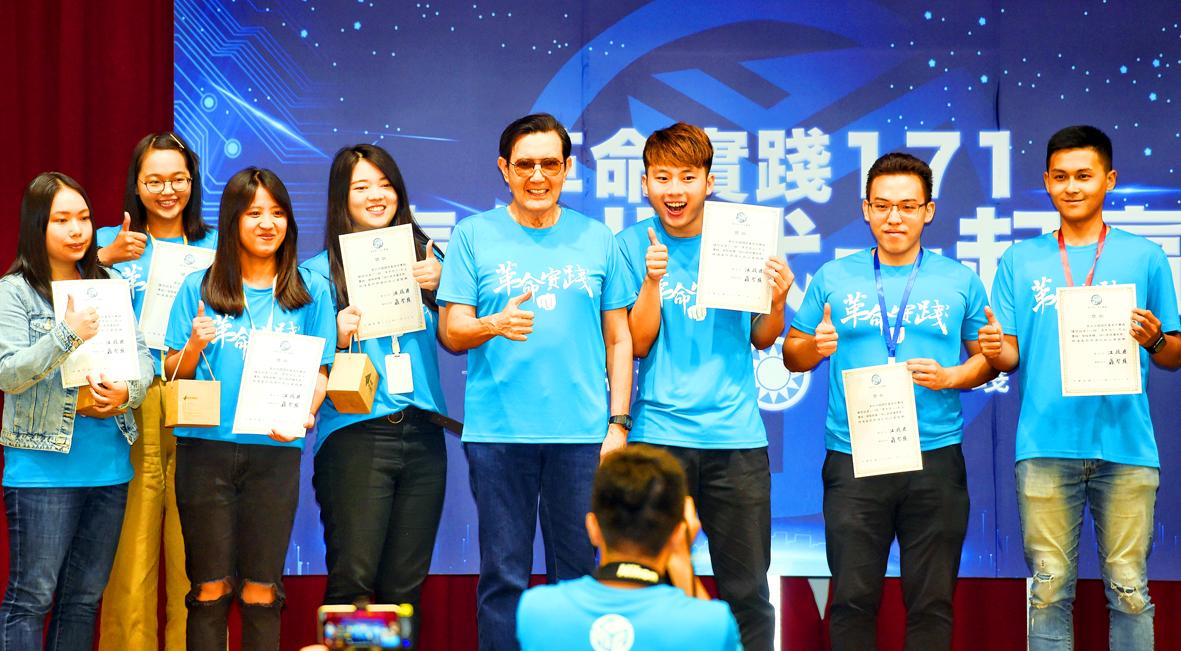Former president Ma Ying-jeou (馬英九) yesterday called on critics of the so-called “1992 consensus” to propose a feasible alternative, and urged Beijing to accept the “complete” version of the “consensus” if it is to advocate it.
Recently, the “1992 consensus” has been a popular topic within the Chinese Nationalist Party (KMT), Ma said, calling the discussion a “healthy sign” of the party’s willingness to reflect.
While many people have said they want Beijing to face the reality of the Republic of China’s (ROC) existence, it would be “impossible” for Beijing to “hold a press conference announcing that the Republic of China really exists,” Ma said.

Photo: Fang Pin-chao, Taipei Times
The “1992 consensus,” a term former Mainland Affairs Council chairman Su Chi (蘇起) in 2006 admitted making up in 2000, refers to a tacit understanding between the KMT and the Chinese Communist Party that both sides of the Taiwan Strait acknowledge there is “one China,” with each side having its own interpretation of what “China” means.
Ma said the “consensus” was the most circumlocutory way of achieving the goal of bringing China to concede the ROC’s existence.
Ma said people who propose changing the “1992 consensus” or oppose it should propose an “equally feasible alternative plan.”
In the meantime, the KMT should work to “de-stigmatize” the “consensus,” he said.
Chinese President Xi Jinping’s (習近平) mention of the “1992 consensus” in his speech on Jan. 2 last year was “a bit different from what we usually hear,” Ma said.
His comments in that speech gave President Tsai Ing-wen (蔡英文) an opportunity to say that the “consensus” means “one country, two systems,” he said, adding that they had also had a great impact on the KMT’s performance in the subsequent elections.
The KMT must clarify that the “consensus” does not equal “one country, two systems,” he said.
Ma said that Beijing seems unwilling to accept the “each side having its own interpretation” part of “one China, with each side having its own interpretation,” attacking the provision on numerous occasions.
If the Chinese government is to advocate the “1992 consensus,” it must be the “complete 1992 consensus,” he said, adding that without “each side having its own interpretation,” there was no “one China,” and no “consensus.”
Ma made the remarks at the closing ceremony of a two-day workshop at the KMT Institute of Revolutionary Practice in Taipei.
Ma is a former participant of the workshop — now in its 171st session — as are former vice president Wu Den-yih (吳敦義) and former KMT chairwoman Hung Hsiu-chu (洪秀柱).
Additional reporting by Shih Hsiao-kuang

Taiwan has received more than US$70 million in royalties as of the end of last year from developing the F-16V jet as countries worldwide purchase or upgrade to this popular model, government and military officials said on Saturday. Taiwan funded the development of the F-16V jet and ended up the sole investor as other countries withdrew from the program. Now the F-16V is increasingly popular and countries must pay Taiwan a percentage in royalties when they purchase new F-16V aircraft or upgrade older F-16 models. The next five years are expected to be the peak for these royalties, with Taiwan potentially earning

POSITIVE DEVELOPMENT: Japan and the US are expected to hold in-depth discussions on Taiwan-related issues during the meeting next month, Japanese sources said The holding of a Japan-US leaders’ meeting ahead of US President Donald Trump’s visit to China is positive news for Taiwan, former Japan-Taiwan Exchange Association representative Hiroyasu Izumi said yesterday. After the Liberal Democratic Party’s landslide victory in Japan’s House of Representatives election, Japanese Prime Minister Sanae Takaichi is scheduled to visit the US next month, where she is to meet with Trump ahead of the US president’s planned visit to China from March 31 to April 2 for a meeting with Chinese President Xi Jinping (習近平). Japan and the US are expected to hold in-depth discussions on Taiwan-related issues during the

‘LIKE-MINDED PARTNER’: Tako van Popta said it would be inappropriate to delay signing the deal with Taiwan because of China, adding he would promote the issue Canadian senators have stressed Taiwan’s importance for international trade and expressed enthusiasm for ensuring the Taiwan-Canada trade cooperation framework agreement is implemented this year. Representative to Canada Harry Tseng (曾厚仁) in an interview with the Central News Agency (CNA) said he was increasingly uneasy about Ottawa’s delays in signing the agreement, especially as Ottawa has warmed toward Beijing. There are “no negotiations left. Not only [is it] initialed, we have three versions of the text ready: English, French and Mandarin,” Tseng said. “That tells you how close we are to the final signature.” Tseng said that he hoped Canadian Prime Minister Mark Carney

STAY IN YOUR LANE: As the US and Israel attack Iran, the ministry has warned China not to overstep by including Taiwanese citizens in its evacuation orders The Ministry of Foreign Affairs (MOFA) yesterday rebuked a statement by China’s embassy in Israel that it would evacuate Taiwanese holders of Chinese travel documents from Israel amid the latter’s escalating conflict with Iran. Tensions have risen across the Middle East in the wake of US and Israeli airstrikes on Iran beginning Saturday. China subsequently issued an evacuation notice for its citizens. In a news release, the Chinese embassy in Israel said holders of “Taiwan compatriot permits (台胞證)” issued to Taiwanese nationals by Chinese authorities for travel to China — could register for evacuation to Egypt. In Taipei, the ministry yesterday said Taiwan